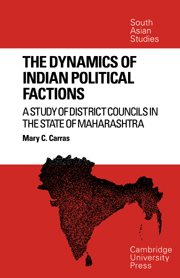Book contents
- Frontmatter
- Contents
- List of tables
- List of maps
- Acknowledgments
- 1 Introduction
- 2 The Argument
- 3 Political Integration: Empirical Conception and Method of Analysis
- 4 Ratnagiri District: Factional Alignments in Conditions of Poverty
- 5 Poona District: The Politics of Sugar
- 6 Aurangabad District: State versus District Leaders
- 7 Akola District: Factional Alignments in Conditions of Relative Plenty (The Politics of Cotton)
- 8 All Districts: Some Comparisons
- 9 Conclusion
- APPENDICES
- Notes
- Bibliography
- Index
3 - Political Integration: Empirical Conception and Method of Analysis
Published online by Cambridge University Press: 23 November 2009
- Frontmatter
- Contents
- List of tables
- List of maps
- Acknowledgments
- 1 Introduction
- 2 The Argument
- 3 Political Integration: Empirical Conception and Method of Analysis
- 4 Ratnagiri District: Factional Alignments in Conditions of Poverty
- 5 Poona District: The Politics of Sugar
- 6 Aurangabad District: State versus District Leaders
- 7 Akola District: Factional Alignments in Conditions of Relative Plenty (The Politics of Cotton)
- 8 All Districts: Some Comparisons
- 9 Conclusion
- APPENDICES
- Notes
- Bibliography
- Index
Summary
In the previous chapter, I suggested that political factionalism defines a condition lacking integration. Political integration has been described as a ‘relationship of community among people within the same political entity’ who are held together by ‘mutual ties… which give the group a feeling of identity and awareness.’
Although the Congress government and party organization in Maharashtra have been generally considered among the few in the Indian states which enjoy a satisfactory degree of political integration, this study will demonstrate that latent conflicts exist within the Maharashtrian polity which may, within the next five or ten years, threaten the stability of the political system, at least insofar as that stability has been ensured by a heretofore unified Congress Party. I propose to establish that these underlying tensions were manifested in the factional formations observed in the course of this study, and that these factions were developing their own ‘feelings of identity and self-awareness’, centered around conflicting interests.
In order to substantiate these claims, it is necessary to establish initially that each of the groups to which I refer does, in fact, have some (significant) degree of cohesion which distinguishes it from the other. This directs me toward a search for visible attributes of cohesion which could conceivably generate divisive feelings between the groups.
- Type
- Chapter
- Information
- The Dynamics of Indian Political FactionsA Study of District Councils in the State of Maharashtra, pp. 46 - 58Publisher: Cambridge University PressPrint publication year: 1972



